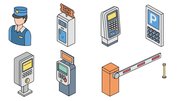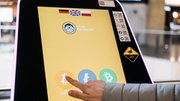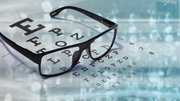Article
Digital media makes NRF impression
IBM, NCR, others jump into the self-service entertainment market.

January 14, 2008
NEW YORK — The popularity of Apple's iTunes and Redbox's DVD-rental kiosk was evident Monday at the National Retail Federation's annual Show & Expo, though not in the form of those devices.
The popular online digital music store and DVD kiosk were not on display at the NRF show, but their influence was felt on several of the retail digital media offerings on the show floor. Digital media kiosks were introduced by self-service giants IBM and NCR as smaller companies like Mediaport introduced their own products.
The rise in digital media kiosk popularity is due largely to consumer demand and the fact that only a small portion of music is bought on the Internet, said Dave Champlin, vice president of marketing for Mediaport.
"We offer them a place to get quality content onto their cool devices (such as a cell phone or MP3 player)," Champlin said.
Mediaport's MediaATM system is a self-service kiosk that allows consumers to download digital content such as movies and music on-demand. The company recently inked its first video-download deal with a major studio, NBC Universal.
Last week, Mediaport installed several of its kiosks at the Consumer Electronics show and let convention-goers download free NBC Universal-owned episodes, spanning such shows as 30 Rock and Project Runway. At NRF, Mediaport let attendees create a custom mixed-CD from the kiosk's music catalog, which included Led Zeppelin and Pink Floyd.
The launch of NCR's Xpress Entertainment follows the company's acquisition of Touch Automation, a privately held firm that provides the digital media merchandising kiosk.
The machine enables rentals, sales of shrink-wrapped media or a combination. In addition to transactions at the kiosk, future versions of the device will allow consumers to interact and download content via the Internet or their mobile devices.
 |
NCR introduces its Xpress Entertainment kiosk at the NRF show. |
"Self-service is best when all three self-service channels (automated kiosk, Internet and mobile device) are utilized," said Mike Webster, vice president of NCR's self-service solutions. "This is only the first phase for this kiosk."
Webster said the kiosk can be deployed in virtually any venue, including retail stores, convenience stores, supermarkets, quick-serve restaurants, shopping malls and airports.
IBM's Digital Movie Kiosk, touted as the ATM for movies, is the culmination of a partnership with Ireland-based Portomedia. The kiosk allows consumers to rent or purchase DVD-quality movies, which are downloaded in under a minute to a small USB device called the Movie Key. The kiosk itself can be loaded with anywhere from 500 to 1,000 movies and can be refreshed with new content from a remote location.
"It's essentially a Blockbuster in a box," said Cathal Deavy, Portomedia's director of marketing.
One of the reasons movie studios have allowed companies like Portomedia to sell its content is the kiosk's use of DRM, or digital-rights management. For example, if a consumer rents a movie, that person may only have 48 hours to watch that movie before the movie's license expires. That person would then have a chance to either rent the movie again or purchase it before they could watch it yet again.
Portomedia and IBM bypassed the Redbox-like DVD-rental kiosk for digital content because they see it as being more flexible, Deavy said. With a digital download kiosk, the content is always in stock and there are no returns.
Watch this Web site in the coming days for more news and insight from NRF 2008.
 ChatGPT
ChatGPT Grok
Grok Perplexity
Perplexity Claude
Claude










